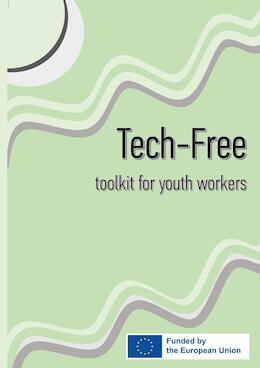Toolbox — For Training and Youth Work
All new tools in your inbox: Be the first to know about new tools for learning with our e-mail notifications.
Simulation Exercise, Energiser, Manual, Group Building Activity
TECH-free Toolkit for youth workers
TECH-free Toolkit for youth workeres is an innovative toolkit containing useful knowledge and step-by-step instructions for activities that develop skills necessary for the prevention of digital addiction and dysfunctional use of the internet and screens.
Aims of the tool
Enhance youth workers' knowledge about the origins and extent of digital addiction.
Develop youth workers' skills in supporting young people at risk of digital addiction.
Sensitize youth workers about the triplet of uncovered needs of the youth in the digital era.
Equip youth workers with activities for the fulfillment of young people's physical, emotional and social needs.
Support youth workers with step-by-step instructions of activities.
Description of the tool
The present toolkit was created to serve towards the enhancement of skills and knowledge that youth workers may need in order to help young people maintain safe internet and technology attitudes and healthy behaviours related to the use of digital screen devices. It includes theoretical background on the subjects of internet addiction and self-thematization in the social media. Moreover the toolkit contains physical health oriented suggestions, mindfulness activities, reflective activities, as well as self-monitoring checklists that may promote a healthier use of the internet and related digital screen devices.
The aspiration of the creators of this the toolkit is to serve youth workers in their continuous attempt to be properly equipped to face the challenges of the digital era.
This toolkit addresses youth workers such as teachers, social workers, therapists, group facilitators, educational psychologists, volunteer group leaders, who may use the suggested activities in their daily work with young people, who have established a dysfunctional relationship with digital screen devices and run the risk of addiction to the internet. The suggested activities are presented in a thorough way and are explained step-by-step, so that professionals may share useful information with their colleagues and cause multiplying beneficial effects in the lives of young people. Furthermore, youth workers may make good use of the toolkit by performing the suggested activities for their own personal benefit, in order to overcome negative results of the overuse of digital devices and internet in their work lives. Thus, they may develop healthy work skills or everyday routines that may allow for better quality in their work, and eventually contribute to the wellness of young people.
Available downloads:
Disclaimer
SALTO cannot be held responsible for the inappropriate use of these training tools. Always adapt training tools to your aims, context, target group and to your own skills! These tools have been used in a variety of formats and situations. Please notify SALTO should you know about the origin of or copyright on this tool.
Tool overview

http://toolbox.salto-youth.net/4107
This tool is for
Youth workers Social workers Psychologists Group facilitators Addiction specialists Teachers
and addresses
Group Dynamics, Personal Development, Conflict Management
It is recommended for use in:
Training and Networking
Capacity Building
Behind the tool
The tool was created by
Poreia Ygeias (Health Route) sce
in the context of
TECH-free training course, 2023-1-EL02-KA153-YOU-000148735
The tool has been experimented in
TECH-free Training Course
The tool was published to the Toolbox by
Ioannis Dovros (on 22 March 2024)
and last modified
22 March 2024
Comments
No comments have been posted yet.
If you want to comment on this tool, you need to be signed in with your MySALTO account. Sign in now